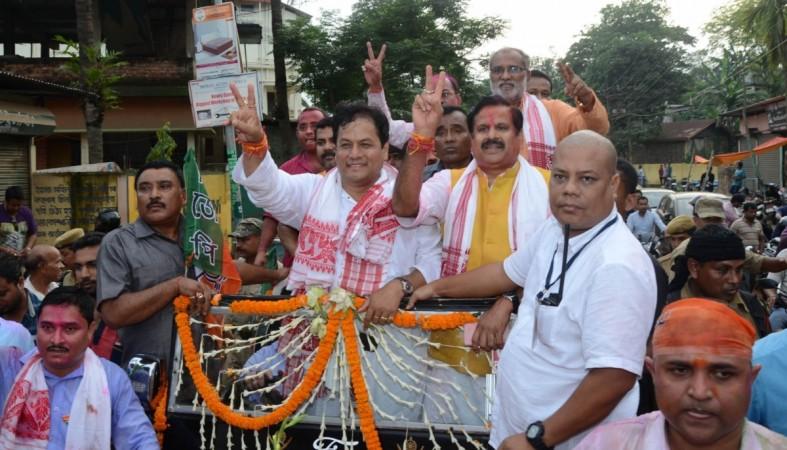
The BJP-led alliance's two-thirds majority (86 out of 126 seats) in the recently-concluded Assam assembly polls has debunked the theory of en bloc voting by Muslims. This is proven by the fact that the Bharatiya Janata Party (BJP) won 15 out of the 49 Muslim-majority seats, says a report.
Another report attributes the win to "Hindu consolidation" around the party in the largest Northeast state that also borders Muslim-majority Bangladesh and Bhutan.
The Hindu cited findings shared by Bhanu Joshi of the Centre for Policy Research, who was a member of a team that travelled and studied the Assam polls. A split in votes between the Congress and the Badruddin Ajmal-led All India United Democratic Front (AIUDF), in addition to some votes going to the BJP and its allies threw up a result that is being seen as unprecedented in the state's politics.
"Of these 49 constituencies (culled from census data), the BJP won 15 seats, the Congress 14 and the AIUDF 12 and the NDA allies Asom Gana Parishad (AGP) five and Bodoland People's Front two. These are results for 48 out of the 49 seats," the daily reported.
Joshi illustrated the phenomenon with the victory of AGP, a BJP ally, in one such constituency.
"For example, in a constituency called Bokakhat in Lower Assam where the Muslim vote is decisive, Atul Bora of the AGP won by a margin of over 40,000 votes against the Congress's Arun Phukan. How does one explain that except that there is a sophisticated voting public that is making choices based on different kinds of information," the Hindu quoted him as saying.
Hindu vote consolidation
A post-poll survey data analysis done for the Indian Express by Lokniti shows about 63 percent of voters who identified themselves as Hindu (on being asked their religion), "ended up voting for the BJP and its election partners."
Also, a high turnout among Hindu voters ensured that the BJP alliance had a decisive edge over its rivals, the Congress and the AIUDF. In the recently-held assembly polls, the Hindu voter turnout was 86 percent as against 82 percent by Muslim voters, the analysis reveals.
Consolidation of Hindu votes did not keep pace with Muslim votes. The Indian Express report, referring to the analysis, also says that despite constituting 34 percent of the population (the highest outside J&K), Muslims did not vote as a bloc in Assam in the recent assembly elections.
Implications for Uttar Pradesh assembly elections 2017
Parties such as the ruling Samajwadi Party (SP), which are perceived as benefitting from consolidation of Muslim votes may have to worry.
In the 2012 assembly elections in the state, the SP won 61 seats from constituencies where the Muslim population ranges between 20 and 50 percent, the Hindustan Times had reported in March 2012. The Congress managed to take only 15, while the BJP won 16 and the Bahujan Samaj Party 25 seats.
A redux may not be possible for the Mulayam Singh Yadav-led SP in the elections due in 2017, if the results of Assam are any indication.
In Uttar Pradesh, Hindu votes had rallied behind the BJP, enabling it to sweep the Lok Sabha elections. "The BJP seems to have succeeded in evolving a grand Hindu coalition, while the Muslim vote by and large went to non-BJP parties," the Hindu had reported after the general elections results in May 2014.
If the trend is repeated in the assembly elections due next year, the BJP will have an edge over its rivals.

















